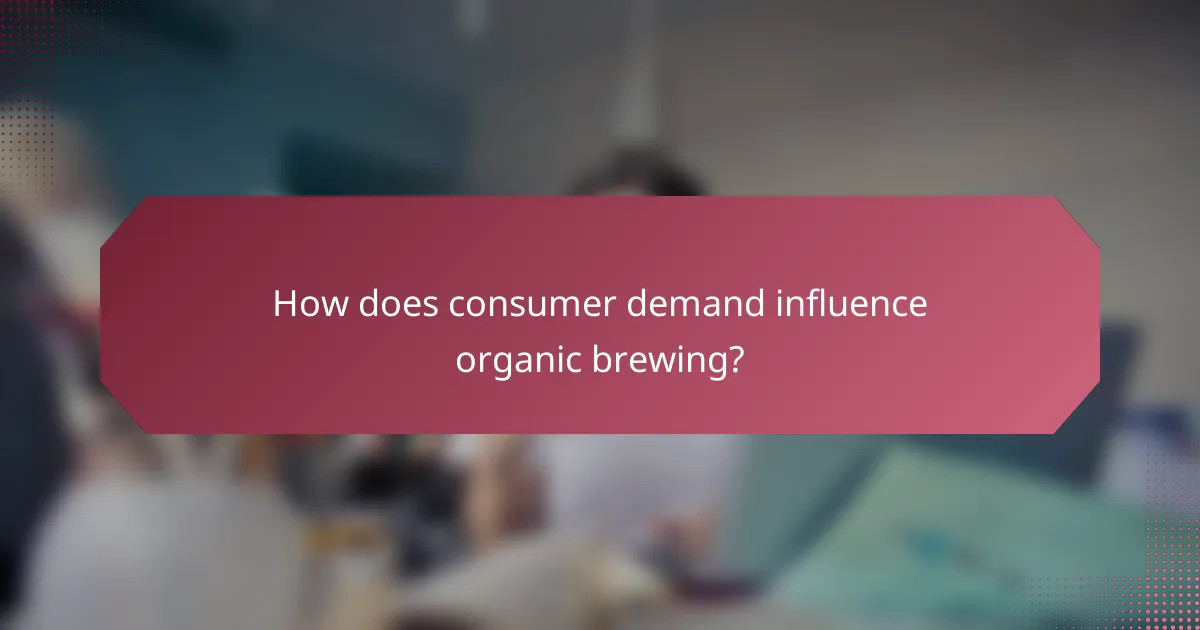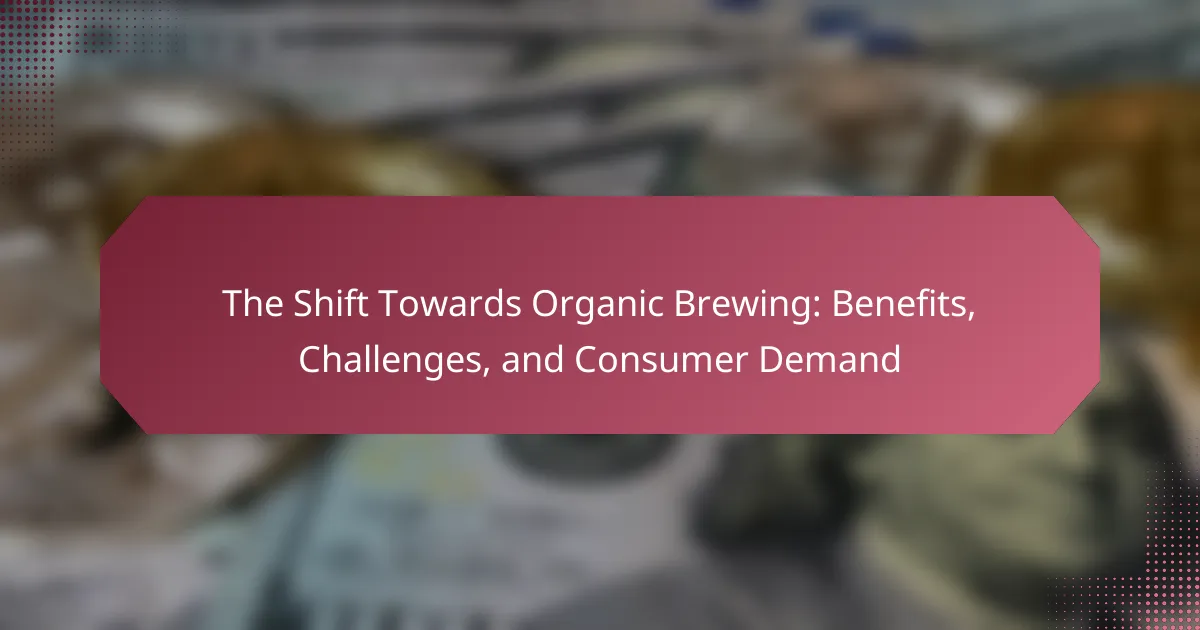The article focuses on the shift towards organic brewing, a trend where breweries are increasingly using organic ingredients and sustainable practices in response to consumer demand for healthier products. This movement is driven by a significant preference among consumers for organic options, with 55% indicating a desire for such products. Organic brewing not only enhances a brewery’s brand image but also aligns with broader sustainability trends in the food and beverage industry. The article discusses the impact of consumer preferences on production practices, the financial implications of sourcing organic materials, and the promising future of the organic beer market, projected to reach $2.1 billion by 2025. Additionally, it highlights innovations in brewing techniques and regulatory support that contribute to the growth of organic brewing.

What is the Shift Towards Organic Brewing?
The shift towards organic brewing refers to the increasing trend of breweries adopting organic ingredients and practices. This movement is driven by consumer demand for healthier and environmentally sustainable products. Organic brewing involves using ingredients that are grown without synthetic pesticides or fertilizers. Many breweries are responding to market research indicating that 55% of consumers prefer organic products. Additionally, organic certification can enhance a brewery’s brand image and attract environmentally conscious customers. This shift also aligns with broader trends in the food and beverage industry towards sustainability and natural products.
Why is there a growing interest in organic brewing?
There is a growing interest in organic brewing due to increasing consumer demand for sustainable and health-conscious products. Organic brewing uses ingredients that are free from synthetic pesticides and fertilizers. This appeals to consumers who prioritize environmental sustainability. Studies show that organic products are perceived as healthier options. For example, a survey by the Organic Trade Association found that 82% of Americans believe organic food is healthier. Additionally, organic brewing often features unique flavors and qualities. This attracts craft beer enthusiasts looking for distinctive brews. The rise of eco-consciousness among consumers further fuels this interest. As a result, more breweries are adopting organic practices to meet market demands.
What defines organic brewing compared to traditional brewing?
Organic brewing is defined by the use of organic ingredients and sustainable practices. Organic brewing requires all ingredients, including grains, hops, and yeast, to be certified organic. Traditional brewing may use non-organic ingredients that can contain synthetic pesticides and fertilizers. Organic brewing also emphasizes environmentally friendly practices, such as water conservation and renewable energy. In contrast, traditional brewing does not necessarily prioritize these sustainability measures. The USDA regulates organic certification, ensuring compliance with strict farming and processing standards. This certification process supports organic brewing’s commitment to health and environmental stewardship.
How has the perception of organic products evolved in recent years?
The perception of organic products has significantly improved in recent years. Consumers increasingly view organic products as healthier and more environmentally friendly. A 2021 survey indicated that 76% of consumers believe organic food is better for their health. Additionally, organic products are now associated with higher quality and better taste. The market for organic products has expanded, with sales reaching over $61 billion in the U.S. in 2020. This growth reflects a shift in consumer priorities towards sustainability and ethical sourcing. Social media and influencers have also played a crucial role in promoting organic lifestyles. Overall, the perception of organic products has evolved from niche to mainstream acceptance.
What are the key benefits of organic brewing?
Organic brewing offers several key benefits. First, it promotes environmental sustainability. Organic ingredients are grown without synthetic pesticides or fertilizers. This practice reduces soil and water pollution. Second, organic brewing supports biodiversity. It encourages the use of diverse crops and farming practices. Third, organic beers often have enhanced flavor profiles. Many consumers report that organic beers taste fresher and more robust. Fourth, organic brewing aligns with health-conscious consumer trends. Studies indicate that organic products may contain fewer harmful residues. Lastly, organic brewing can improve marketability. The demand for organic products has surged, attracting more consumers. These benefits collectively contribute to the growing popularity of organic brewing.
How does organic brewing impact health and wellness?
Organic brewing promotes health and wellness by using ingredients free from synthetic pesticides and fertilizers. This process reduces exposure to harmful chemicals. Organic beverages often contain higher levels of antioxidants. Antioxidants are beneficial for reducing inflammation and supporting overall health. Studies have shown that organic products can have better nutritional profiles. For example, a study published in the Journal of Agricultural and Food Chemistry found that organic grains can contain more phenolic compounds. These compounds contribute to better heart health. Furthermore, organic brewing practices often prioritize sustainability, which can enhance community well-being. Sustainable practices support local farmers and reduce environmental impact. Overall, organic brewing offers health benefits linked to cleaner ingredients and supportive agricultural practices.
What environmental advantages does organic brewing offer?
Organic brewing offers several environmental advantages. It reduces chemical pesticide and fertilizer use. This practice promotes biodiversity in ecosystems. Organic brewing supports soil health through sustainable farming methods. It minimizes water pollution by avoiding harmful runoff. Organic ingredients often require less energy for production. This contributes to lower carbon emissions. Additionally, organic brewing typically involves local sourcing. This reduces transportation emissions and supports local economies. Overall, organic brewing fosters a more sustainable and eco-friendly approach to beverage production.
How does organic brewing enhance flavor and quality?
Organic brewing enhances flavor and quality by using high-quality, natural ingredients without synthetic pesticides or fertilizers. This method promotes the growth of complex flavors in the final product. Organic grains and hops often have richer flavor profiles. Additionally, organic practices encourage biodiversity in farming, which can lead to unique taste characteristics. Studies show that organic ingredients can result in better aroma and mouthfeel in beverages. For example, a study published in the Journal of Agricultural and Food Chemistry found that organic barley had higher levels of certain flavor compounds compared to conventional barley. This results in a more vibrant and authentic tasting experience for consumers.
What challenges does the organic brewing industry face?
The organic brewing industry faces several significant challenges. One major challenge is the higher cost of organic ingredients. Organic grains and hops are often more expensive than conventional options. This can lead to increased production costs for breweries. Another challenge is the limited availability of organic ingredients. Sourcing enough organic materials can be difficult, especially for small breweries. Regulatory compliance is also a concern. Organic certification requires adherence to strict guidelines, which can be time-consuming and costly. Additionally, consumer awareness and demand for organic products can vary. Some consumers may not understand the benefits of organic brewing. These factors can hinder growth in the organic brewing sector.
What are the economic barriers to starting an organic brewery?
High startup costs are a significant economic barrier to starting an organic brewery. Equipment for brewing, fermentation, and packaging can be expensive. Organic ingredients often cost more than conventional ones, impacting overall budget. Additionally, securing a location with proper zoning can involve high rental or purchase costs. Operating expenses, such as utilities and labor, can also be higher due to the nature of organic production. Accessing financing can be challenging, as lenders may perceive organic breweries as riskier investments. Market competition can further strain resources, making it difficult to establish a customer base. These factors combined create a complex financial landscape for potential organic brewery owners.
How do regulations affect organic brewing practices?
Regulations significantly affect organic brewing practices by establishing standards for organic certification. These regulations dictate the ingredients that can be used in organic brewing. For example, only certified organic grains, hops, and yeast are permissible. Additionally, brewing processes must avoid synthetic chemicals and genetically modified organisms. Compliance with these regulations ensures that products labeled as organic meet consumer expectations. The USDA National Organic Program sets forth these guidelines in the United States. Adhering to these regulations can increase production costs for brewers. However, it also enhances marketability and consumer trust in organic products.
What sourcing challenges do organic brewers encounter?
Organic brewers encounter several sourcing challenges. One major challenge is the limited availability of organic ingredients. Organic grains, hops, and yeast are not as widely produced as conventional varieties. This scarcity can lead to higher prices for organic ingredients. Additionally, the need for certified organic suppliers complicates sourcing. Brewers must ensure that all ingredients meet organic certification standards. This requirement can limit the number of potential suppliers. Furthermore, fluctuations in organic crop yields can affect ingredient consistency. Weather conditions and farming practices impact the availability and quality of organic produce. These factors create uncertainty in planning and production for organic brewers.

How does consumer demand influence organic brewing?
Consumer demand significantly influences organic brewing by driving production practices and product offerings. As consumers increasingly prioritize sustainability, breweries adapt to meet this preference. The rise in demand for organic ingredients leads to more breweries sourcing certified organic materials. This shift often results in higher production costs, which can be passed on to consumers. Market trends indicate that organic beers often command premium prices, reflecting consumer willingness to pay for quality and sustainability. According to a 2022 report by the Organic Trade Association, organic food sales, including beverages, grew by 12.8%, highlighting a robust consumer interest. Consequently, breweries that embrace organic brewing can enhance their market position and appeal to environmentally conscious consumers.
What factors drive consumer interest in organic beers?
Consumer interest in organic beers is driven by health consciousness, environmental concerns, and quality perceptions. Many consumers associate organic products with better health outcomes. Studies indicate that 70% of consumers believe organic beers are healthier than conventional options. Environmental sustainability also plays a significant role. Organic brewing practices typically reduce chemical runoff and promote biodiversity. Additionally, consumers perceive organic beers as higher quality. Research shows that 60% of craft beer drinkers prefer organic options due to taste and freshness. These factors collectively contribute to the growing demand for organic beers in the market.
How do consumer preferences shape product offerings in organic brewing?
Consumer preferences significantly influence product offerings in organic brewing. As demand for organic products rises, breweries adapt their offerings accordingly. Many consumers prioritize health and sustainability. This trend drives breweries to source organic ingredients. They often create unique flavors to meet consumer tastes. Market research shows a growing preference for transparency in sourcing. Consumers favor brands that disclose ingredient origins. Breweries respond by highlighting their organic certifications. This alignment with consumer values enhances brand loyalty. Overall, consumer preferences shape product innovation and marketing strategies in organic brewing.
What role does marketing play in promoting organic brewing?
Marketing plays a crucial role in promoting organic brewing by raising awareness and educating consumers. It helps highlight the benefits of organic ingredients, such as sustainability and health advantages. Effective marketing strategies create a strong brand identity for organic breweries. These strategies often include social media campaigns, influencer partnerships, and community events. Research shows that 54% of consumers prefer products with organic labels, indicating a growing demand. Marketing also differentiates organic brews from conventional options, emphasizing unique flavors and production methods. By engaging consumers through storytelling, brands can foster loyalty and trust. Overall, marketing is essential for driving consumer interest and sales in the organic brewing sector.
How is the market for organic brewing evolving?
The market for organic brewing is experiencing significant growth. This growth is driven by increasing consumer demand for sustainable and healthy beverage options. In 2022, the organic beer market was valued at approximately $1.5 billion. Projections indicate it could reach $2.5 billion by 2028, reflecting a compound annual growth rate of over 10%. More breweries are adopting organic practices to meet this demand. Additionally, many consumers are becoming more aware of the environmental impact of their choices. This awareness is prompting a shift towards organic ingredients and sustainable brewing methods. The trend is also supported by regulatory changes promoting organic farming and production.
What trends are emerging in organic beer consumption?
Emerging trends in organic beer consumption include increased consumer awareness and demand for sustainability. Many consumers are prioritizing health and environmental concerns, leading to a rise in organic beer sales. According to a report by Grand View Research, the organic beer market is expected to grow significantly, with a projected CAGR of 10.5% from 2022 to 2030. Craft breweries are increasingly adopting organic ingredients to meet this demand. Additionally, there is a growing interest in local sourcing of organic ingredients. This trend supports local economies and reduces carbon footprints. Consumers are also exploring diverse flavors and styles within the organic category. These trends reflect a broader shift towards mindful consumption in the beverage industry.
How do demographics affect the demand for organic brewing?
Demographics significantly influence the demand for organic brewing. Age, income, education, and lifestyle choices shape consumer preferences. Younger consumers, particularly Millennials and Gen Z, show a strong preference for organic products. They prioritize sustainability and health, driving demand for organic brewing options. Higher income levels correlate with increased spending on premium organic beverages. Additionally, consumers with higher education levels tend to be more informed about the benefits of organic products. Geographic location also plays a role; urban areas often have greater access to organic breweries and a higher demand for such products. According to a 2021 market research report, 60% of consumers aged 18-34 actively seek organic options in their beverage choices.

What is the future of organic brewing?
The future of organic brewing appears promising due to increasing consumer demand for sustainable products. As awareness of environmental issues grows, more breweries are adopting organic practices. The global organic beer market is projected to reach $2.1 billion by 2025, reflecting this trend. Additionally, the health-conscious consumer base is driving interest in organic ingredients. Breweries that prioritize organic sourcing often see a competitive advantage. Regulatory support for organic farming further enhances this growth potential. Innovations in organic brewing techniques are also emerging, improving efficiency and product quality. Thus, the future of organic brewing is likely to be characterized by expansion and innovation.
How can organic brewers adapt to changing market conditions?
Organic brewers can adapt to changing market conditions by diversifying their product offerings. This includes introducing new flavors and styles to attract a broader consumer base. They can also focus on sustainable sourcing of ingredients to enhance their brand appeal. Emphasizing transparency in their brewing processes can build consumer trust. Additionally, leveraging digital marketing strategies can help reach new audiences effectively. Engaging with local communities and participating in events can strengthen brand loyalty. According to a report by the Brewers Association, craft beer sales grew by 4% in 2021, indicating a positive market trend for innovative brewers. Adapting to consumer preferences for health and sustainability is crucial for long-term success.
What innovations are being introduced in organic brewing techniques?
Innovations in organic brewing techniques include the use of advanced fermentation methods, such as spontaneous fermentation. This technique allows for the development of unique flavors through wild yeast and bacteria. Additionally, some brewers are implementing regenerative agriculture practices. These practices enhance soil health and biodiversity, contributing to sustainable ingredient sourcing.
Another innovation is the utilization of precision brewing technology. This technology optimizes brewing parameters, improving efficiency and consistency in organic beer production. Furthermore, there is an increasing trend toward using locally sourced organic ingredients. This reduces carbon footprints and supports local economies.
Research indicates that these innovations are gaining traction among consumers. A survey by the Brewers Association found that 65% of craft beer drinkers prefer organic options. This consumer demand drives continuous innovation in the organic brewing sector.
How can collaboration within the industry foster growth?
Collaboration within the organic brewing industry fosters growth by enhancing innovation and sharing resources. When breweries collaborate, they can combine expertise to develop new brewing techniques. This leads to unique products that attract more consumers. Joint marketing efforts can also increase brand visibility and reach. Shared distribution networks reduce costs and expand market access. Collaborative events, like festivals, create community engagement and boost sales. Research indicates that partnerships in the craft beverage sector can increase profitability by up to 20%. By working together, breweries can navigate challenges more effectively, ensuring sustainable growth in a competitive market.
What best practices can organic brewers implement for success?
Organic brewers can implement best practices such as sourcing high-quality organic ingredients. Using fresh, locally sourced materials enhances flavor and sustainability. Maintaining strict organic certification standards is essential for credibility. Regular training for staff on organic practices ensures consistency and quality. Investing in eco-friendly brewing equipment reduces environmental impact. Engaging with the community through events fosters brand loyalty. Lastly, utilizing social media effectively promotes products and connects with consumers. Studies show that transparency in sourcing increases consumer trust, which is vital for success in organic brewing.
How can organic brewers effectively engage with consumers?
Organic brewers can effectively engage with consumers by highlighting their sustainable practices and product quality. They should share information about the sourcing of organic ingredients. Transparency about brewing processes builds trust with consumers. Engaging storytelling about the brand’s mission resonates with eco-conscious customers. Utilizing social media platforms allows for direct interaction with the audience. Hosting tasting events and brewery tours creates immersive experiences. Collaborating with local businesses fosters community connections. Research shows that 70% of consumers prefer brands with clear sustainability messages. This indicates that emphasizing organic practices can enhance customer loyalty.
What strategies can enhance sustainability in organic brewing?
Implementing energy-efficient technologies can significantly enhance sustainability in organic brewing. These technologies reduce energy consumption during production processes. Utilizing renewable energy sources, such as solar or wind power, further decreases the carbon footprint.
Adopting water conservation practices is essential. Techniques like rainwater harvesting and efficient water recycling minimize water usage. Additionally, sourcing organic ingredients locally reduces transportation emissions.
Employing waste management strategies also contributes to sustainability. Composting spent grains and recycling packaging materials lowers waste output. Furthermore, engaging in sustainable farming practices ensures the long-term viability of organic ingredients.
Research indicates that breweries adopting these strategies can decrease their environmental impact by up to 30%. This data underscores the effectiveness of sustainability initiatives in organic brewing.
The main entity of the article is organic brewing, which refers to the practice of brewing beer using organic ingredients and sustainable methods. The article explores the growing trend of organic brewing driven by consumer demand for healthier and environmentally friendly products, detailing the benefits such as enhanced flavors, health advantages, and environmental sustainability. It also addresses the challenges faced by the industry, including higher costs and sourcing difficulties, while highlighting the impact of consumer preferences on product offerings and market growth. Additionally, the article discusses the future of organic brewing, emphasizing the importance of innovation, collaboration, and best practices for success in this evolving market.



